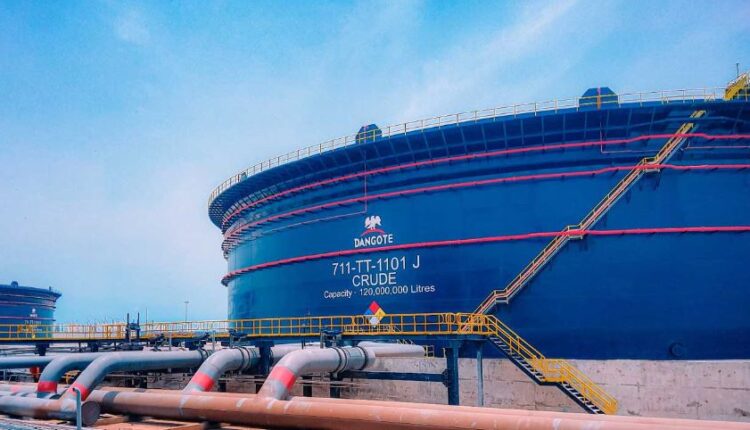Nigeria, Africa’s largest crude oil producer, has increased its imports of US WTI crude due to the Dangote Oil Refinery’s growing need for the commodity.
The refinery is Africa’s largest and one of the world’s most important crude processing plants, with an installed capacity of 650,000 barrels per day.
The refinery is owned by Aliko Dangote, Africa’s richest man with an estimated net worth of $28 billion.
According to Bloomberg ship-tracking data, the Dangote Refinery, located in Nigeria’s commercial hub, imports roughly one-third of its oil from the United States, primarily West Texas Intermediate (WTI) Midland grade. This share has nearly increased since 2024, when the refinery started operations.
Analysts attribute the growing buying of American crude to a combination of strategic and operational considerations.
In the face of global competition, OPEC member nations have struggled to increase crude output cheaply. However, this dynamic has enabled the 650,000-bpd refinery to obtain additional stored US petroleum, notably WTI, as it approaches full operating capacity.
Another reason Dangote prefers WTI is the higher yield of gasoline and refined products.
Furthermore, because to ongoing trade disputes between the United States and China, parts of the Asian market for WTI crude shrunk this year, increasing the availability of American petroleum in other regions, notably West Africa.
The higher intake of US crude coincides with a decrease in the supply of Nigerian crude. According to Bloomberg, U.S. crude is likely to account for a greater proportion of Dangote’s imports in June than domestic supply.
The Dangote refinery started generating fuel in 2024. Diesel and naphtha production started in January, followed by gasoline in September.
Read Also: Petrol Subsidy Fraud Cost Nigeria $450 Million – Ex-EFCC Chief Bawa
The usage of US oil corresponds to the refinery’s increased processing capacity and the decrease in available Nigerian crude for purchase.
WTI Midland, the dominant grade.
WTI Midland is the largest stream of the six benchmark crude grades. It was included in the pricing basket due to worries about the steady depletion of the other five North Sea oil fields—Brent, Forties, Oseberg, Ekofisk, and Troll—which could enhance market volatility.
According to dealers who track Dangote’s purchasing patterns, the refinery’s WTI Midland intake is anticipated to hit 14 million barrels this summer. According to vessel bookings, the trading company Vitol Group is the major source of these US barrels.
Aliko Dangote named the Dangote Refinery’s main access road after Nigerian President Bola Tinubu, honoring his continuous support for the project and privately-led infrastructure development. The declaration came during the official commissioning of the Deep-Sea Port Access Road, which connects the Dangote Fertilizer Plant to Eleko Junction in Lagos State.
Dangote said President Tinubu, “You are largely responsible for the Dangote Refinery complex.” Mr. President, I’d like to emphasize that Bola Ahmed Tinubu Road will now be the principal route to our refinery.
He noted that, despite the difficult economic conditions, President Tinubu has instilled investment confidence. “Mr. President, you’re a brave leader. I hope you continue your fantastic work. I am grateful for all of your support and inspiration.”
According to Dangote, the renamed access road is part of a broader infrastructural network connected to the refinery. This network is expected to connect Nigeria to neighboring nations like Chad and Cameroon.
The Epe-Ijebu-Ode corridor also connects to the Sagamu-Benin Expressway, which serves as a critical logistical route.
Crude oil achieves its first weekly rise in three weeks.
A solid US jobs report and the resumption of US-China trade talks have raised growth hopes in the world’s two largest economies.
Crude oil closed up $1 per barrel in the final trading session of the week, marking its first weekly increase in three weeks. West Texas Intermediate crude closed at $64 a barrel, up 2%.
Supply patterns in the global oil market also contributed to the price increase. Nine OPEC members with production targets boosted output less than planned in May.
Iraq and the UAE either did not boost production or did so only slightly.
Meanwhile, Libya, one of the three OPEC members not subject to quotas, increased production to a 13-year high of more over 1.3 million barrels a day. Total OPEC output in May was 27.54 million barrels per day, or 200,000 barrels per day higher than in April.

